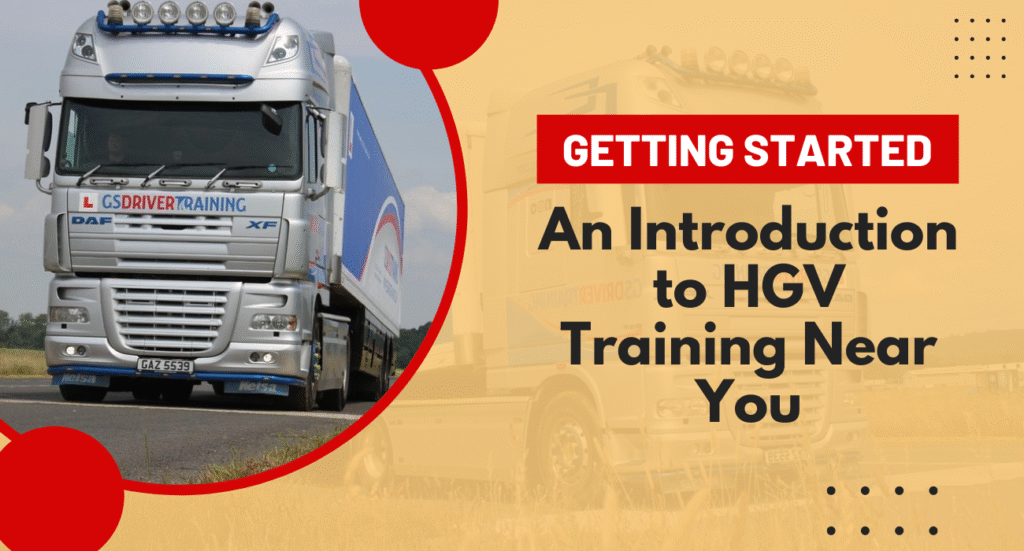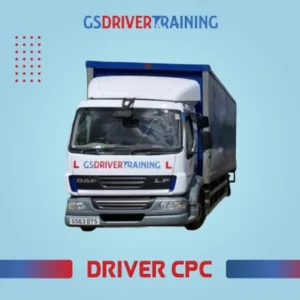Getting Started – An Introduction to HGV Training Near You
Ready to kickstart your journey into the world of HGV driving? Join GS Driver Training, your trusted partner in professional driver education. Discover the path to success with our ‘Getting Started – An Introduction to HGV driver training Near You’ program. Get behind the wheel and learn from the best in the industry.
Don’t wait. Start your HGV training today with GS Driver Training. Your future on the road begins here!
Introduction
Welcome to our blog, which is all about HGV training near you! HGV training is a great way to equip yourself with the necessary skills and qualifications to start a career in lorry and class 1 HGV driving. We’ll be exploring all the details you need to know, from the cost of an HGV licence to preparing for and learning the ropes of HGV driving, so you can be well prepared when taking the wheel of a big rig. We’ll also introduce some of the best HGV training centres near you and provide tips and advice on finding the right HGV training course. So whether you’re a newbie looking to drive an HGV for the first time or an experienced driver wanting to refresh your knowledge, this blog will cover you. Let’s get started!
Overview of HGV Training
HGV (Heavy Goods Vehicle) training is designed to give prospective drivers the skills and knowledge required to safely and legally operate HGVs of various sizes. It covers a range of topics, including principles of driving, vehicle manoeuvres, vehicle handling in different road conditions, loading and unloading, and vehicle maintenance. The tuition for HGV training often takes place in traditional classroom settings, but it can also be done using a combination of online and practical on-the-road tuition. Different HGV training courses are often tailored to suit particular types of vehicles, such as long-distance haulage, short-distance haulage, recovery, and emergency services vehicles. Depending on your experience and qualifications, you can take the entire training course or a refresher course. When looking for HGV training in your area, it’s essential to make sure that a certified driving institute offers it to ensure that you receive quality tuition.
How to Find HGV Training Near You
If you want to become a qualified HGV driver and get started as soon as possible, finding HGV training near you can be the first step in achieving your goal. With the right kind of instruction, you can obtain all the necessary skills to drive a lorry, truck, or other large goods vehicle on the roads. So, if you’re seeking the best and easiest way to gain the necessary training, here are a few tips on how to find HGV training near you. Start your search by searching online for HGV training providers in your area, ensuring you read through their reviews and find one that meets your needs.
You may also want to enquire locally at lorry businesses to determine if they offer courses or have provider recommendations. Once you have researched, contact the training provider to receive all the information, including the course duration, cost, and the documents required to enrol. Remember that if you plan on working as an HGV driver, you’ll need to obtain a particular license category. Once you have completed your training and are ready to take the driving test, you’ll be fully qualified and prepared to get behind the wheel.
Identifying a Suitable Course
Before starting your career as a lorry driver, you need to find a suitable training course. Always look for an established, reputable course provider that meets your needs. Consider the hours of training required, such as the Driver CPC, which is mandatory for lorry and truck drivers and other subjects to become qualified drivers of HGVs. When selecting your course, pay attention to the details and ensure that the underpinning knowledge and practical skills are taught before signing up. That way, you can be confident that, upon completing the course, you have the knowledge and skills necessary to become a successful HGV driver. If it sounds too good to be true, then do more research, as some providers are only interested in taking your money for you later to find out you have been let down repeatedly.
Types of HGV Training Near You
If you’re looking to become a professional HGV driver, you’ll need to find out what types of HGV training are available near you and which will be the best course for your needs. You can look for lessons in LGV Driver Training, Professional Driver Certificate (PDC), HGV Advanced Test, and Class 1 or 2 driver training. Depending on the type of job you want to do and your location, you may also find courses in HGV driver CPC, Medical CPC, Digital Tachograph, Motorway Driving and Refresher Training. There are even courses for those already with experience in the industry, such as Tippers, Low Loaders and Electric Vehicles. It’s worth researching the different types of HGV training near you so that you can get the best and most suitable course for your needs. Lorry driving has many different roles, so think about which one suits you best.
Class 1 HGV Training
HGV class 1 Training is a highly sought-after qualification, enabling you to progress your career as a professional driver working with HGVs. At GS Driver Training, we understand that you need to feel confident and prepared to take your Class 1 HGV Training, so we’ll provide you with the latest up-to-date training packages to ensure you make the most of your journey to obtaining the licence. We’ll take you on a step-by-step journey to earning your licence through emails, short courses and individual lessons, ensuring you’ve got all the knowledge and know-how to be effective and efficient once you’re on the road. Keep an eye on our website and contact us to learn more about our fantastic Class 1 HGV Training programmes.
Other Training Types
If you want to become a professional bus driver, consider obtaining a PCV bus licence. This licence will enable you to legally drive passenger-carrying vehicles, which can include buses, coaches, and minibuses – the range of vehicles you can drive depends on the training you have received. Depending on your experience, obtaining a PCV bus licence can range from a few days to several weeks, with qualified and experienced drivers having the shortest training time, as they require fewer hours of driving experience before they can apply. You must be at least 21 years old to apply, and your training will include comprehensive instruction on drivers’ hours, the unladen weight of vehicles, and vehicle safety regulations, as well as an understanding of the Bus driving experience and the rules you must adhere to when driving a vehicle. Once qualified as a driver, the Driver and Vehicle Standards Agency will strictly monitor your driving time. Hence, you must understand the rules and regulations set out by them.
HGV Licence Cost
The cost is one of the most important things to consider when looking to start HGV (Heavy Goods Vehicle) training. Depending on the kind of licence you’re looking to get, such as C1, C or CE, your HGV licence cost can depend on the training centre and the time involved. Most HGV training courses will include expenses such as theory and practical tests, medicals and registration with the Driver and Vehicle Standards Agency (DVSA). Prices can range anywhere from a few hundred to a few thousand pounds, so it’s essential to shop around and compare offers to get your HGV licence.
What to Consider Before Registering for HGV Training
If you want to get your HGV driving licence, it’s essential to do your research and ensure you’re signing up with the right training provider. One of the most important things to remember before registering is to avoid booking with brokers. Investigate the training school directly, and make sure it is an approved centre with a good reputation and quality training materials. Make sure that they offer the type of HGV courses you are looking for and the type of vehicles you would likely drive in the job you plan to do after you complete your training. Be sure to ask questions about the quality of the course materials and resources you will be provided with and find out what support and guidance the school can deliver throughout the course.
Practical Training
Practical training is an essential part of HGV training near me. Many people dream of becoming lorry drivers but are daunted by the prospect of learning the complex rules of the road and manoeuvring huge trucks. The good news is that practical training courses are now available to help you get to grips with this daunting task. Through practical training, you will learn how to handle vehicles of all sizes safely and get some hands-on experience with each of the different classes of trucks.
Driving Tests
If you’re considering taking an HGV driving test, there’s no time like the present! This essential qualification is the key to unlocking a world of opportunities in the commercial vehicle sector. Taking your test can be daunting, so it’s vital to find a reputable and experienced HGV training provider near you to support and prepare you for success. With the right training program, you can gain the knowledge and confidence required for a successful test and embark on a successful career in the HGV industry.
Theory Exam
HGV driving tests can be daunting for even the most experienced drivers. The theory exam, in particular, is seen as a difficult hurdle to overcome, and it’s essential to be prepared for the HGV theory test before you take it. Thankfully, plenty of driving instruction services are available in the UK to help get drivers up to speed and provide the necessary information for passing the test. Whether it’s one-on-one instruction or a course-based learning process, these driving instructors will help you understand the questions posed in the questionnaire and familiarise you with the highway code and regulations for HGV drivers. No matter your situation, an experienced HGV instructor is the best way to approach the theory test and give you the best chance of succeeding.
Practical Exam
HGV driving tests are practical exams that must be passed to qualify as an HGV driver. HGV driving tests are designed to enable drivers to demonstrate their ability to safely and reliably operate a large vehicle. It is important to ensure you choose the right training provider for HGV driving tests, and you can do this easily by researching HGV training near you. The HGV driving test usually consists of an independent driving assessment, vehicle safety questions and an element to assess the driver’s ability to manoeuvre the vehicle. Passing an HGV practical exam is a key step to becoming a qualified lorry driver and enabling you to hit the open road.
CPC (Certificate of Professional Competence) for Drivers
The CPC (Certificate of Professional Competence) for drivers is a mandatory qualification for professional drivers in the European Union (EU) and the United Kingdom (UK). It’s designed to improve road safety, enhance driver professionalism, and ensure that drivers are competent in their roles. Here’s an overview of the CPC for drivers:
There are two types of CPC
Driver CPC (Initial CPC)
This is the qualification that aspiring professional drivers must obtain to work in certain sectors, such as HGV (Heavy Goods Vehicle) or PCV (Passenger Carrying Vehicle) transportation. To obtain an Initial CPC, aspiring drivers must pass a series of tests, including a theory test, a practical test, and the CPC case study test. This ensures they are well-prepared for professional driving.
Driver CPC (Periodic Training)
This is ongoing training that professional drivers must complete every five years to maintain their Driver CPC qualification. Periodic training involves completing a specific number of hours of approved training every five years. This training covers various topics, including road safety, regulations, eco-driving, and customer service, to enhance a driver’s knowledge and skills.
Professionalism and Safety
The CPC focuses on enhancing professionalism and safety in the commercial driving industry. It promotes good practices and ensures drivers are aware of their responsibilities.
CPC Training Centres
Training for the CPC is typically provided by approved training centers. These centres offer courses and materials that fulfill the CPC requirements.
Benefits
Obtaining and maintaining the CPC qualification can lead to better career opportunities, increased safety on the road, and compliance with legal requirements.
Advice for New HGV Drivers
If you’re starting with HGV driving, you should know the legal requirements and driving techniques you’ll need to succeed. Getting the appropriate training and understanding of the laws and regulations are essential to becoming a qualified HGV driver. It would be best if you also acquainted yourself with the location of the HGV training near you to ensure you are learning at a convenient location. This will help you get the most out of your training program and understand the roadways in your area. The more equipped you are before starting, the higher your chances of success improve.
HGV Driving Hours Explained
HGV (Heavy Goods Vehicle) driving hours are regulations that dictate the maximum amount of time a professional HGV driver can spend operating a commercial vehicle within a specific period. These regulations are put in place to promote road safety, prevent driver fatigue, and ensure that drivers are well-rested. Here’s an explanation of HGV driving hours:
Daily Driving Limit: The daily driving limit typically restricts an HGV driver to a maximum of around 9 hours of driving time within a 24-hour period. This 24-hour period usually starts when the driver begins their workday.
Breaks and Rest Periods: In addition to the daily driving limit, HGV drivers must take regular breaks and rest periods. These include mandatory rest breaks during the workday and a daily rest period, often lasting at least 11 hours.
Weekly Driving Limit: HGV drivers are also subject to a weekly driving limit. This limit typically allows a maximum of around 56 hours of driving within a 7-day period.
Fortnightly Limit: In some regions, there’s a fortnightly limit, which restricts drivers to a certain number of driving hours within a 14-day period.
45-Minute Break: HGV drivers are often required to take a 45-minute break if they drive for more than 4.5 hours continuously. This break can be split into two separate breaks, with the first lasting at least 15 minutes and the second at least 30 minutes.
Maximum Working Hours: There’s usually a maximum working hours limit that encompasses all work-related activities, not just driving. This limit includes driving time, time spent loading and unloading, administrative tasks, and other work-related activities. It can be around 60 hours in a week, which can be extended to 70 hours on a limited number of occasions.
Record Keeping: HGV drivers are required to maintain accurate records of their driving hours, rest breaks, and other work-related activities. These records are often kept in electronic logging devices (ELDs) or paper logbooks.
Consequences of Non-Compliance: Non-compliance with HGV driving hours regulations can lead to penalties, fines, and the potential suspension of a driver’s commercial driving license. It’s crucial for drivers and operators to adhere to these regulations.
Variations by Region: The specific regulations and limits for HGV driving hours can vary from one region to another. It’s essential for HGV drivers to be familiar with the regulations that apply to their location.
HGV driving hours regulations are vital for the safety of HGV drivers and other road users. They help prevent driver fatigue and ensure that drivers have adequate rest, reducing the risk of accidents and improving overall road safety. It’s crucial for HGV drivers and operators to understand and follow these regulations to maintain safe and responsible commercial driving practices.
FAQ
Q. What is a Professional Driving Qualification? (Driver CPC)
Ans: In many countries, including the UK and the EU, professional lorry and truck drivers must obtain a Driver CPC (Certificate of Professional Competence). This qualification includes both theoretical and practical training, and it’s mandatory for those driving professionally.
Q. What are Lorry or Truck Driving Hours? Explained?
Ans: Truck drivers are subject to regulations regarding how many hours they can drive in a given period. These regulations are in place to ensure driver safety and prevent fatigue-related accidents. Hours of service (HOS) regulations vary by country, but they typically include limits on daily driving, rest breaks, and maximum weekly driving hours.
Q. Do I need Truck Driving Experience?
Ans: Truck driving can be a rewarding career, offering opportunities for long-haul transport, local deliveries, and specialized hauling. To gain truck driving experience, individuals usually start by obtaining the necessary licenses and then find employment with a trucking company.
Q. What are Driver Hours and Driving Hours?
Ans: Driver hours refer to the total number of hours a professional driver can work in a specific time frame, including driving and non-driving hours. Adhering to these hours is essential for safety and compliance with regulations.
Q. What is HGV (Heavy Goods Vehicle) Driving?
Ans: HGV drivers operate large vehicles for transporting goods. To drive an HGV professionally, you’ll typically need to obtain the appropriate license, such as Category C or C+E in the UK, and meet other legal requirements.
Q. What is Driving HGV? (Heavy Goods Vehicle)
Ans: HGVs, or lorries or trucks, are large vehicles designed for transporting goods. To become an HGV driver, you typically need to follow these steps. Obtain the appropriate driving license: This often involves specific categories such as Category C (for rigid vehicles) or Category C+E (for articulated vehicles) in the UK. CompleteDriver CPC training: In many countries, including the UK and EU, you need to complete a Certificate of Professional Competence (CPC) qualification. Gain practical experience: To become a skilled HGV driver, you’ll need hands-on training and experience. Many drivers start as trainees or apprentices with a trucking company.
Q. What are Drivers Hours Regulations?
Ans: Drivers’ hours regulations are in place to ensure the safety of HGV drivers and other road users by preventing driver fatigue. These regulations typically include limits on daily driving hours, mandatory rest breaks, and weekly maximum driving hours. For example, in the EU and the UK, there are rules such as a maximum of 9 hours of daily driving (which can be extended to 10 hours twice a week) and required rest periods during each driving day.
Q. Different Experiences in HGV Driving?
Ans: Experiences in HGV driving can vary widely based on factors such as the type of goods transported, the route, and the specific job role. Here are some common experiences associated with HGV driving: Some HGV drivers use long-haul transport, covering extensive distances and staying away from home for extended periods. Others may focus on local deliveries, transporting goods within a specific region. Certain HGV drivers work in specialized fields, such as hazardous materials (ADR drivers) or temperature-controlled transport (reefer drivers).
HGV driving can be physically demanding and mentally challenging. Drivers must navigate different road conditions, manage tight delivery schedules, and handle various types of cargo. Many HGV drivers enjoy a degree of independence on the road, as they are responsible for the safe and timely transport of goods.
It’s important to note that the experiences of HGV drivers can vary greatly, and the job can come with both rewards and challenges. Factors like company culture, working conditions, and the specific routes you drive can significantly influence your experience as an HGV driver.
Also Read: What’s the Difference Between LGV and HGV









